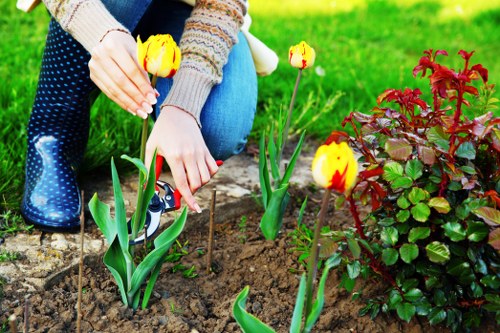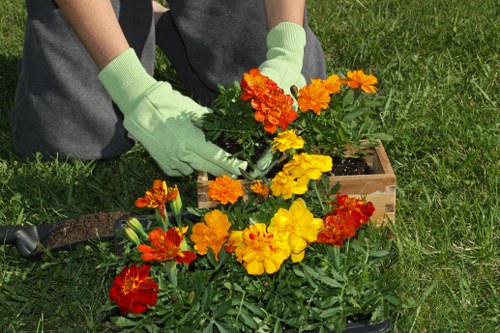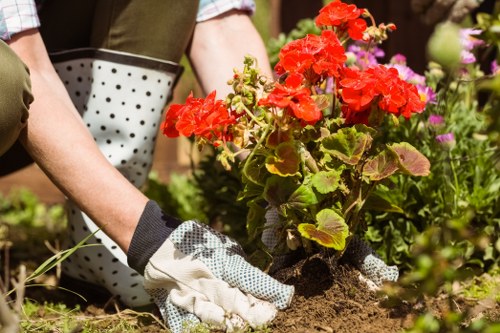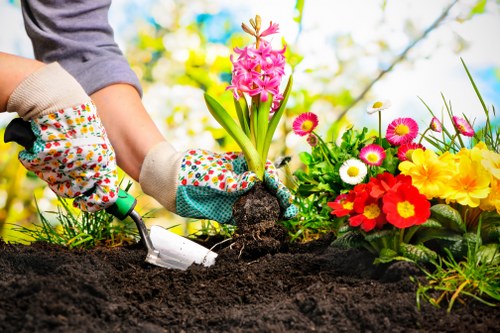Garden Maintenance in Lewisham
Welcome to Premier Garden Maintenance Services

Maintaining a beautiful garden in Lewisham requires dedication, expertise, and a keen understanding of the local climate and soil conditions. Whether you're a seasoned gardener or a novice, regular maintenance ensures your outdoor space remains vibrant and healthy throughout the year.
Garden maintenance not only enhances the aesthetic appeal of your home but also provides a serene environment where you can relax and unwind. In Lewisham, where urban living meets natural beauty, having a well-maintained garden can significantly boost your property's value and your personal well-being.
In this comprehensive guide, we'll explore the essential aspects of garden maintenance in Lewisham, offering tips and insights to help you achieve a thriving garden all year round.
Essential Garden Maintenance Tasks

Keeping your garden in top shape involves a variety of tasks that need to be performed regularly. These tasks ensure that your plants remain healthy, your garden stays neat, and potential issues are addressed promptly.
Here are some of the essential garden maintenance tasks you should consider:
- Weeding: Removing unwanted plants helps prevent competition for nutrients and water.
- Pruning: Trimming trees and shrubs promotes healthy growth and maintains desired shapes.
- Lawn Care: Regular mowing, fertilizing, and aerating keep your lawn lush and green.
- Planting and Replanting: Adding new plants and replacing old ones keeps your garden fresh and vibrant.
- Irrigation Management: Proper watering schedules ensure your plants receive the right amount of moisture.
Seasonal Garden Maintenance

Different seasons bring unique challenges and opportunities for garden maintenance. Understanding how to adjust your maintenance routine throughout the year is crucial for a thriving garden.
Spring Maintenance
Spring is the perfect time to prepare your garden for the growing season. Focus on clearing debris, pruning dead branches, and planting new flowers and vegetables. It's also essential to check your irrigation systems and repair any damage caused by winter weather.
Summer Maintenance
During the summer months, your garden will require regular watering and weeding. Mulching can help retain moisture in the soil, and deadheading flowers encourages continuous blooming. It's also a good time to manage pests and diseases that may arise due to the warmer weather.
Choosing the Right Plants for Lewisham Gardens

Selecting plants that are well-suited to the Lewisham climate and soil conditions is essential for successful garden maintenance. Native plants often require less maintenance and are more resilient against local pests and diseases.
Consider incorporating a mix of perennials, annuals, and shrubs to add variety and ensure year-round interest in your garden. Additionally, selecting plants that bloom at different times can provide continuous color and attract beneficial insects like bees and butterflies.
Hardscape Elements
Incorporating hardscape elements such as pathways, patios, and garden beds can enhance the functionality and aesthetics of your garden. Properly maintained hardscape features provide structure and can make garden maintenance tasks more manageable.
Professional Garden Maintenance Services in Lewisham

While some garden maintenance tasks can be handled independently, hiring professional garden maintenance services in Lewisham can save you time and ensure high-quality results. Professional gardeners have the expertise, tools, and resources to tackle complex maintenance tasks effectively.
By opting for professional services, you can enjoy a well-maintained garden without the stress of managing it yourself. Services typically include regular lawn care, pruning, pest control, fertilization, and seasonal clean-ups.
Benefits of Hiring Professionals
- Expertise: Skilled gardeners understand the specific needs of various plants and can provide tailored care.
- Time-Saving: Professional services allow you to focus on other aspects of your life while your garden is expertly maintained.
- Equipment: Access to specialized tools and machinery ensures efficient and effective maintenance.
- Consistent Results: Regular professional maintenance guarantees a consistently beautiful and healthy garden.
DIY Garden Maintenance Tips
If you prefer a hands-on approach, there are several DIY garden maintenance tips that can help you keep your Lewisham garden in excellent condition.
Regular Inspections
Conducting regular inspections of your garden allows you to identify and address issues before they escalate. Look for signs of pests, diseases, or nutrient deficiencies and take appropriate action promptly.
Soil Health
Healthy soil is the foundation of a thriving garden. Regularly testing your soil's pH and nutrient levels can guide you in making necessary amendments, such as adding compost or fertilizers.
Watering Techniques
Proper watering is crucial for plant health. Water your garden early in the morning or late in the evening to minimize evaporation and ensure that plants receive adequate moisture.
Sustainable Garden Maintenance Practices

Embracing sustainable garden maintenance practices not only benefits the environment but also contributes to the long-term health of your garden. Here are some eco-friendly tips to incorporate into your maintenance routine:
- Composting: Recycle garden waste into nutrient-rich compost to enhance soil fertility.
- Rainwater Harvesting: Collect rainwater to use for irrigation, reducing your reliance on municipal water sources.
- Organic Pest Control: Use natural remedies and beneficial insects to manage pests instead of chemical pesticides.
- Native Plants: Planting native species supports local wildlife and requires less maintenance.
Implementing these sustainable practices can lead to a more resilient and environmentally friendly garden.
Tools and Equipment for Effective Garden Maintenance
Having the right tools and equipment is essential for efficient garden maintenance. Investing in quality tools can make your gardening tasks easier and more enjoyable.
Basic Gardening Tools
- Pruners: For trimming and shaping plants.
- Spade: Essential for digging and turning soil.
- Garden Hose: For watering plants effectively.
- Rake: Useful for leveling soil and removing debris.
- Gloves: Protect your hands while working in the garden.
Advanced Equipment
For larger gardens or more intensive maintenance, consider investing in advanced equipment such as lawnmowers, hedge trimmers, and irrigation systems. These tools can significantly reduce the time and effort required to maintain your garden.
Planning and Designing Your Garden

A well-planned garden layout can simplify maintenance and enhance the overall appearance of your outdoor space. Consider factors such as sunlight, soil type, and plant compatibility when designing your garden.
Creating Garden Beds
Designing garden beds with proper spacing and plant selection ensures optimal growth and minimizes competition for resources. Raised beds can also improve drainage and make maintenance tasks more manageable.
Pathways and Access
Incorporating pathways and accessible routes within your garden design allows for easy navigation and maintenance. Materials like gravel, stone, or wood can add both functionality and aesthetic appeal.
Irrigation Planning
Thoughtfully planned irrigation systems ensure that all areas of your garden receive adequate water without wastage. Automated irrigation systems can provide consistent watering schedules, making maintenance more efficient.
Common Garden Problems and Solutions
Even with regular maintenance, gardens can encounter various issues. Identifying and addressing these problems promptly can prevent further damage and maintain the health of your garden.
Pest Infestations
Pests can cause significant damage to your plants if not controlled. Regular monitoring and the use of natural pest control methods can help manage infestations without harming the environment.
Disease Management
Plant diseases can spread quickly if not treated. Ensuring proper plant spacing, adequate sunlight, and good air circulation can reduce the risk of disease. Remove and dispose of infected plant parts to prevent further spread.
Weed Control
Weeds compete with your plants for nutrients and water. Regular weeding, mulching, and the use of landscape fabric can help keep weeds at bay.
Enhancing Garden Health Through Fertilization
Fertilizing your garden provides essential nutrients that support plant growth and development. Understanding the specific nutrient needs of your plants can help you choose the right fertilizer.
Types of Fertilizers
- Organic Fertilizers: Made from natural materials like compost, manure, and bone meal, they improve soil structure and fertility.
- Inorganic Fertilizers: Synthetic fertilizers provide precise nutrient ratios but may require careful application to avoid overuse.
- Slow-Release Fertilizers: These provide a steady supply of nutrients over time, reducing the risk of fertilizer burn.
Fertilization Schedule
Establishing a regular fertilization schedule based on the growth cycle of your plants ensures they receive the necessary nutrients at optimal times.
Maintaining a Healthy Lawn
Your lawn is a central feature of your garden and requires consistent care to stay healthy and attractive. Proper lawn maintenance involves mowing, watering, fertilizing, and pest control.
Mowing Techniques
Mowing your lawn at the correct height promotes strong root growth and reduces weed competition. Avoid cutting more than one-third of the grass blade at a time to prevent stress on the grass.
Watering Practices
Deep and infrequent watering encourages deep root systems, making your lawn more drought-resistant. Early morning watering reduces evaporation and minimizes the risk of fungal diseases.
Fertilization for Lawns
Applying fertilizer during the growing season supplies essential nutrients that keep your lawn green and robust. Choose a fertilizer with the appropriate nutrient balance for your grass type.
Pruning and Trimming: Keeping Your Garden Neat
Pruning and trimming are vital for maintaining the shape and health of your plants. Regular pruning encourages healthy growth, removes dead or diseased branches, and enhances the overall appearance of your garden.
When to Prune
Different plants have specific pruning times. Generally, early spring is ideal for most trees and shrubs, while flowering plants may require pruning after blooming.
Pruning Techniques
- Thinning: Removing entire branches at their base to increase air circulation.
- Heading: Cutting back branches to promote bushier growth.
- Deadheading: Removing spent flowers to encourage new blooms.
Tools for Pruning
Investing in sharp, quality pruning tools ensures clean cuts and reduces the risk of damaging plants. Common tools include pruning shears, loppers, and pruning saws.
Mulching: Benefits and Application
Mulching involves covering the soil surface around plants with materials like bark, straw, or compost. Mulching offers numerous benefits, including moisture retention, temperature regulation, and weed suppression.
Types of Mulch
- Organic Mulch: Materials like wood chips, leaves, and straw improve soil quality as they decompose.
- Inorganic Mulch: Options like gravel, rubber, and landscape fabric provide long-lasting weed control.
Application Tips
Apply mulch in a layer about 2-3 inches thick, ensuring it doesn't touch the plant stems to prevent rot. Replenish mulch as needed to maintain its effectiveness.
Benefits of Mulching
Mulching conserves soil moisture, reduces temperature fluctuations, and enhances the appearance of your garden. It also adds nutrients to the soil as organic mulches break down.
Integrating Hardscaping for Enhanced Functionality
Hardscaping elements like patios, walkways, and retaining walls add structure and functionality to your garden. Properly integrated hardscaping enhances the overall design and makes maintenance tasks more manageable.
Choosing Hardscape Materials
- Stone: Durable and natural-looking, ideal for pathways and walls.
- Wood: Versatile for decks and pergolas, adding warmth to the garden.
- Concrete: Long-lasting and suitable for larger structures like patios.
Design Considerations
When planning hardscaping, consider the layout, functionality, and how it complements your garden's overall design. Ensure that hardscape elements are proportionate to your garden size and style.
Maintenance of Hardscape Features
Regular cleaning and inspections prevent wear and tear. Sealants may be applied to certain materials to protect against weather damage and extend their lifespan.
Lighting and Irrigation Systems
Incorporating lighting and irrigation systems into your garden enhances both functionality and aesthetics. Proper lighting ensures your garden remains beautiful and safe during evening hours, while efficient irrigation systems provide consistent watering.
Garden Lighting Options
- Path Lights: Illuminate walkways for safety and visual appeal.
- Spotlights: Highlight specific garden features like trees or sculptures.
- Ambient Lighting: Create a warm and inviting atmosphere with string lights or lanterns.
Irrigation System Types
There are various irrigation systems to choose from, including drip irrigation, sprinkler systems, and automated timers. Selecting the right system depends on your garden's size, plant types, and water availability.
Benefits of Automated Irrigation
Automated irrigation systems ensure your plants receive consistent moisture without manual intervention, saving time and water. They can be programmed to adjust watering schedules based on weather conditions.
Creating a Wildlife-Friendly Garden
A wildlife-friendly garden supports local biodiversity and creates a harmonious environment for birds, bees, butterflies, and other beneficial creatures.
Attracting Pollinators
Planting a variety of flowering plants provides essential nectar and pollen sources for pollinators. Incorporate native species that are particularly attractive to local bees and butterflies.
Bird-Friendly Features
Installing bird feeders, birdhouses, and water features encourages birds to visit your garden, helping with natural pest control and adding lively sounds to your outdoor space.
Supporting Beneficial Insects
Creating habitats for beneficial insects like ladybugs and lacewings helps manage pest populations naturally, reducing the need for chemical interventions.
Maintaining Garden Structures
Garden structures such as sheds, greenhouses, and pergolas require regular maintenance to ensure their longevity and functionality.
Shed Maintenance
Keep your garden shed clean and organized to provide a safe space for storing tools and equipment. Regularly inspect for signs of wear, such as leaks or broken hinges, and perform necessary repairs.
Greenhouse Care
Maintaining a greenhouse involves monitoring temperature, humidity, and ventilation to create optimal growing conditions for your plants. Regular cleaning prevents the buildup of pests and diseases.
Pergola Upkeep
Ensure your pergola remains sturdy by checking for loose joints and treating wood surfaces to protect against weather damage. Climbing plants can be trained to grow along pergola structures, enhancing their beauty.
Maximizing Garden Space
Optimizing your garden space allows you to create a more functional and aesthetically pleasing outdoor area. Whether you have a small balcony or a large backyard, strategic planning can make a significant difference.
Vertical Gardening
Utilize vertical space by incorporating trellises, wall-mounted planters, and hanging baskets. Vertical gardening is an excellent solution for small gardens, adding greenery without taking up valuable ground space.
Container Gardening
Growing plants in containers offers flexibility and allows you to move plants as needed. It's ideal for patios, balconies, and areas with limited soil quality.
Space-Saving Designs
Incorporate multi-functional garden elements, such as benches with built-in storage or integrated seating areas, to maximize functionality without compromising on style.
Conclusion: Achieving a Beautiful Garden in Lewisham
Maintaining a beautiful garden in Lewisham is a rewarding endeavor that requires consistent care, thoughtful planning, and the right expertise. Whether you choose to manage your garden independently or enlist the help of professional garden maintenance services, the results will be a lush, vibrant outdoor space that enhances your home and enriches your life.
Embrace the beauty of your Lewisham garden by implementing these maintenance tips and practices. With dedication and the right approach, your garden will thrive, providing joy and tranquility for years to come.
Contact us today to learn more about our garden maintenance services and take the first step towards transforming your outdoor space.

